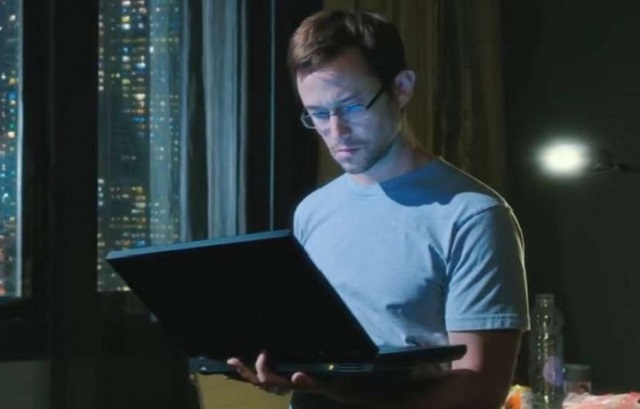Oliver Stone and Edward Snowden seem like an ideal match. The director is (perhaps unfairly) generally known for his conspiracy theories and wackier takes on history, demonstrated in movies such as JFK, Nixon and W. And Snowden is an infamous whistleblower whose dismay and distrust of a government he once fiercely believed in has made him one of the world’s most compelling figures.
Stone really is a better filmmaker when he lets his paranoia and cynicism seep into his work. His more conventional narrative work — especially recent movies, such as 2012’s Savages — doesn’t quite have the same bite to them, nor the warped bent that has made many of his films and characters so memorable. What’s surprising about Snowden is that Stone plays it relatively straight. He clearly believes that his protagonist (played by the utterly likable Joseph Gordon-Levitt) is a heroic figure, but most of the audience likely will too. Are you going to see a movie about Edward Snowden directed by Oliver Stone if you think he’s a thief, fugitive and traitor to his country?
The government isn’t portrayed as inherently evil, though Stone uses news clips featuring politicians with sound bites that sound phony, hypocritical and outright false in light of the events that are portrayed in this film (along with current events that still apply). Some of that Stone sensibility does work its way in through Snowden’s CIA supervisor (Rhys Ifans), who gives his protégé some straight talk about the need for the government to cast civil liberties aside in the name of security, and how it takes some very special people to do whatever is necessary to protect the United States — most especially in the realm of cyber-terrorism.
Ian at the Movies
- Borg vs. McEnroe is surprisingly good, portraying two tennis icons not as different as believed
- Rampage works because it doesn’t try to adapt the video game
- Why Tomb Raider and Alicia Vikander break the bad video game movie trend
- Game Night uses all its pieces well, notably Rachel McAdams, for a twisty story full of laughs
- Black Panther is like no other Marvel film, reaching a higher bar as a result: 5 takeaways
Though his name is surely recognized throughout the world, Snowden might still be something of a mystery to the population at large. So this movie serves to tell us more about the man himself, looking more closely at someone known largely as a talking head on online videos, news reports and documentaries. The meeting in Hong Kong is used as a framing device for the story, but Stone wisely doesn’t devote too much of the film to it, since all of that was depicted thoroughly in Poitras’ documentary Citizenfour, which won the Academy Award for Best Documentary Feature last year.
Is this a case of the documentary being better than the dramatic film? That was the case with Gordon-Levitt’s previous film, The Walk, about Philippe Petit’s walk across the World Trade Center towers. No offense to JGL’s performance in that one, but go see Man on Wire instead. But while Citizenfour is a compelling documentary, it’s not the most cinematic of films. As intriguing as Snowden and Greenwald are, Poitras is largely filming three people in a hotel room. Even though Greenwald (Zachary Quinto), Poitras (Melissa Leo) and Guardian reporter Ewen MacAskill (Tom Wilkinson) are all portrayed by fine actors, Stone’s film is mostly concerned with dramatizing the backstory Snowden shares, then circling back to the hotel room to reset the narrative when necessary.
Yet Snowden wasn’t just some guy either. This isn’t the normal person thrust into highly unusual circumstances story. As the story depicts, he once had ambitions to join the military, notably special forces. But leg injuries rendered him unable to complete training, so he’s forced to find other ways to serve his country. Extremely smart and a vastly talented computer programmer, Snowden opts join the CIA as an analyst.
Though his supervisor initially thinks he’s not quite right for the job (Snowden sheepishly admits during an interview that he thinks it would be cool to have top-level security clearance), the CIA needs bodies to combat growing terrorist threats throughout the world. More importantly, they need brains since those conflicts likely won’t be fought on the battleground in the future.
Snowden aces every test the CIA puts in front of him, and is quickly assigned to important projects designed to find terrorists and suspicious operatives online. Preventing the next 9/11 is the consequence presumably held over all of this work, and used to justify whatever privacy rights and civil liberties might be violated in the process. But Snowden soon learns that the analysts in his department aren’t just looking for terrorists. Through a system called XKeyscore, they’re looking at anyone and everyone who may have made a crack about attacking the president (or typed out particular keywords), and are spying on them through their emails, chats, phones, and even their webcams.
You might expect that kind of behavior from hackers like Elliot and fsociety on Mr. Robot. Perhaps Snowden is naive, thinking that he joined the CIA to protect people and take down bad guys. Don’t most of us believe that they’re up to more secretive and sinister objectives? But one of the reasons Snowden says he wants to join special forces is because of their motto: De Opresso Liber, or “To free the oppressed.” By invading people’s privacy, especially when it isn’t necessary — done just because they can — is the government really freeing anyone or are they causing a new sort of oppression?
The movie is at its best when explaining these programs, and portraying Snowden’s increasing disillusionment with the government’s tactics. He becomes increasingly paranoid that he and his girlfriend, Lindsay (Shailene Woodley), are being monitored, not just because he works for the NSA (and formerly with the CIA), but because he’s expressed doubts and concerns to his colleagues and superiors. The film implies that Snowden’s fellow analysts support his desire to expose the government and its illegal tactics, but don’t have the courage to join him on his way out the door and into exile.
Stone and screenwriter Kieran Fitzgerald maybe try a bit too hard to show the human cost of Snowden’s work through the prism of his relationship with Lindsay. That results in several scenes which might be more appropriate in a romantic comedy or drama. But it is important to show how Snowden is feeling pressure in every aspect of his life, and needs some human interaction to remind that his unique set of skills should not dictate actions that he clearly believes are wrong.
How much you enjoy Snowden will surely be influenced by what you think about the man, his highly polarizing actions and how he’s affected the world. But surprisingly, this isn’t an Oliver Stone polemic. Perhaps it’s because these events are still so recent and he felt some obligation to be more fair to Snowden, someone he could consult directly, rather than go on a screed decades later about a historical figure toward whom he formed strong opinions and beliefs. Regardless, he’s made a film that will make you think about what you’ve seen.





